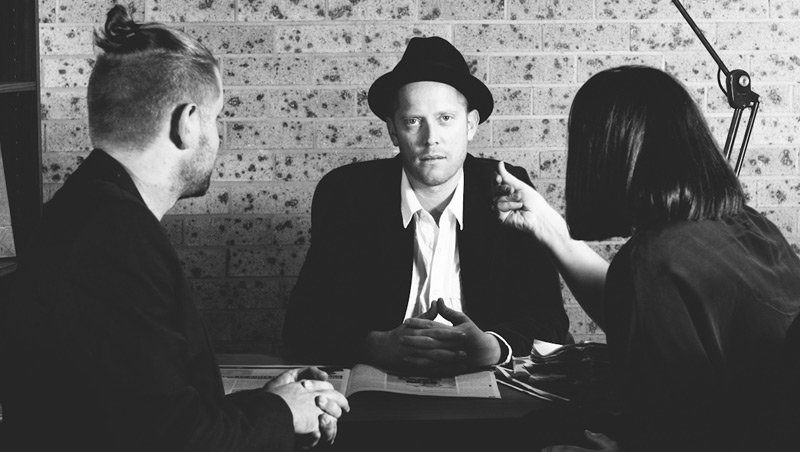FasterLouder story: ‘Urthboy – The Storyteller’, July 2013
A story for FasterLouder; a profile of the Australian hip-hop artist Urthboy. Excerpt below; click the image for the full story.
Andrew McMillen charts Tim Levinson’s rise from petty criminal to one of Australia’s most important musical voices.
The middle child began acting out in his teens. Spurred by small-town boredom, a desire to test the boundaries of authority, and an absentee father, a fascination with petty crime took shape. The adrenaline rush of “bombing” public property with spraypaint cans, breaking into empty buildings, and shoplifting were all par for the course among his friends. The more audacious would steal cars and nearly run over their accomplices by accident, or go “searching” – their innocuous euphemism for the serious transgression of popping store tills, grabbing the money, and fleeing.
Stints in juvenile detention followed for these boys, yet Tim Levinson was in awe of the wits that crime demanded. “Those graffiti artists and crims were the sharpest thinkers and quickest responders to nerve-wracking situations,” he says now. “I feel like I was never really that way inclined.” A voice at the back of his head told him, as the age of 18 fast approached, that soon, these boys would no longer be tried as children in the court system. And so the middle child and petty crime parted ways.
Tim Levinson tells stories. His preferred medium is the song and verse of hip-hop, where he performs under the pseudonym Urthboy, a name which has no greater significance other than sounding cool, an all-important factor for a teenager registering his first Hotmail address. Levinson’s skill in this field has developed to the point at which the 35 year-old finds himself in mid-2013: surrounded by a strong national audience, critical plaudits (three of his four solo albums have been nominated for the industry-polled Australian Music Prize) and widespread respect among his peers of all musical stripes.
For a genre that was largely derided and dismissed at the turn of the century, this country’s hip-hop culture has slowly but surely moved from the fringes to the centre. And at the centre of that culture is this particular storyteller. His father left the family home in the small Blue Mountains town of Wentworth Falls, NSW – population 5650 – when Levinson was nine, owing to issues over drinking and domestic violence.
This separation shook up their lives considerably: suddenly, his mum became the breadwinner through necessity, working up to 14 hours a day to support her three children. Levinson processed this abandonment as best a child could, but would still find himself out on the front lawn some nights, alone, watching cars on the highway and wishing that the tiny headlights of his mother’s beaten-up Corolla would come home.
Music became a refuge during this formative time. His elder brother, Matthew, introduced a raft of influences by sharing his CD and cassette collection. At first, Britpop bands like Blur and Pulp appealed, before his ears attuned to Leonard Cohen. Run DMC’s Tougher Than Leather was the first hip-hop record he truly loved. His own rhymes scribbled on pages would eventually be coupled with beats, and recorded. His first band was named Explanetary, a hip-hop six-piece that featured Levinson and two others on vocals.
Staying in Wentworth Falls never appealed; he moved to Sydney after completing high school. His musical aspirations slowly shifted from a hobby – something done with friends, and not taken seriously – to a full-time career. Explanetary would only record one EP together: In On The Deal, released in May 2001. Twelve years later, Levinson has released four solo albums, five with influential Sydney-based nine-piece band The Herd, and worked with dozens of hip-hop artists to release their music on Elefant Traks, an independent record label that Levinson co-founded in 1998, and where he still works as a label manager.
Despite the widespread enjoyment of this once-niche music genre nowadays, it’s worth remembering that it took quite some time for the nation’s ears to attune to Australian accents backed by synthesised beats. “Because hip-hop was such a strong Afro-American music, it was hard to hear it another way,” says Paul Kelly, who Levinson is supporting on a national tour this month. “But to me, hip-hop is like soccer: it’s very portable, adaptable, and can work worldwide. It just needed to seed for a while here, so that our own blooms could grow out of that. It’s well-suited to local vernacular, so once people get their own style, it’s going to work well, wherever it goes.”
To read the full story, visit FasterLouder.
